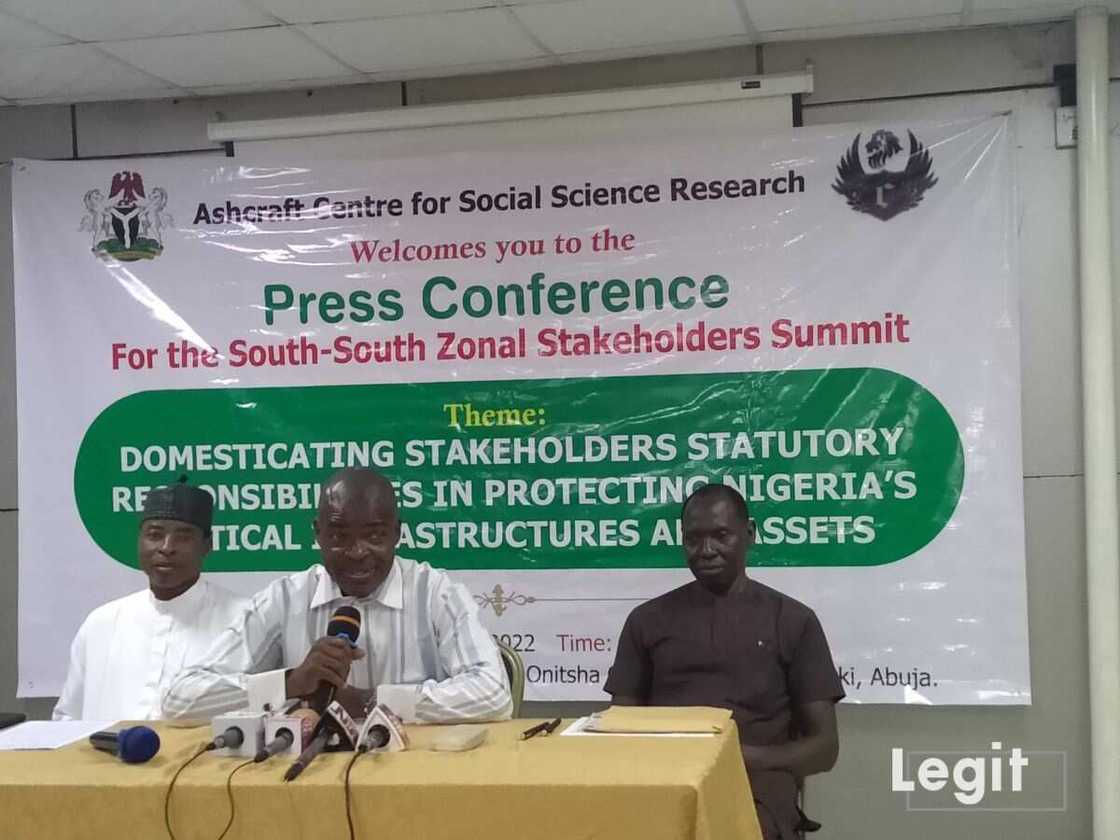Insecurity: Centre Moves to Safeguard Nigeria’s Critical Infrastructures, Hosts Summit in South-South
- There is a need to preserve critical assets and infrastructures owned by the public, the Ashcraft Centre for Social Science Research has said
- Chiakor Alfred, chief of strategic planning and innovations for the Centre said a summit will take place in Port Harcourt Rivers state for this purpose
- According to Alfred, the summit will bring together, stakeholders with a view to intensifying advocacy that will keep them engaged to carry out their statutory responsibilities
PAY ATTENTION: Click “See First” under the “Following” tab to see Legit.ng News on your Facebook News Feed!
Following the incessant attack on public facilities and the increased rate of insecurity across Nigeria, the Ashcraft Centre for Social Science Research has reeled out the importance of safeguarding the nation's critical infrastructures and other assets.
The centre announcing its forthcoming south-south zonal stakeholders summit called on stakeholders' involvement in addressing some of the challenges experienced in the country in terms of insecurity, vandalisation and destruction of government assets.

Source: Original
Speaking at a press briefing in Abuja on Tuesday, July 12, Chiakor Alfred, chief of strategic planning and innovations for the Centre said the summit is themed; 'Domesticating Stakeholders Statutory Responsibilities in Protecting Nigeria's Critical Infrastructures and Other Assets'.
Alfred noted that the summit scheduled to take place at the Atlantic Hall, Hotel Presidential in Port Harcourt on July 25 and 26, will focus on domesticating the accountable blueprints and resolutions from an earlier event in Abuja.
PAY ATTENTION: Subscribe to Digital Talk newsletter to receive must-know business stories and succeed BIG!
According to him, the Abuja summit was convened with the priority objective to infuse a national high-end architecture for systemized response strategy; explore turnkey solutions for deterrence, threat mitigation and recovery and accelerate strategies for systematic intelligence generation.
It also focused on the dissemination and increased security consciousness; establishing a network of proactive stakeholders, agencies and policy-making institutions to initiate and follow up among many others.
Alfred noted that the intensity of insecurity currently experienced in Nigeria can be comparable to what was obtained in Lebanon in the mid-1980s.
His words:
"The almost daily recurrent cases of terrorism, insurgency, cyber-‐crimes, banditry, kidnapping, piracy, oil bunkering, drug trafficking and other forms of organised crime, have created an entirely new security environment.
"Nigeria now faces more security threats that have different characteristics from classic military conflicts between states.
"The gross expansion of the contours that define security boundaries makes it imperative to recognize the eco-‐systemic dimensions of the threats that stare at us daily and in every form."
Citing the attacks in the Kuje Custodial Centre on July 5, the attack on the presidential convoy in Katsina on the same day, and the ransacking of the Tukur Yusufu Buratai Institute for War and Peace, Biu by terrorists among others, Alfred said there is a need to form synergies to tackle the underlying causes of these attacks.
Recommendations needed in safeguarding Nigeria's assets
Speaking further, Alfred said the south-south zonal summit aims to intensify advocacy for stakeholders' statutory responsibilities.
He added:
"It shall also engender the re-engineering of appropriate legislations; and the strategic roadmap for harnessing expert knowledge and country-wide technical support for deterrence, codified response strategy and recovery architecture to Nigeria’s critical assets.
"Equally important is the desire to seek renewed commitment to the challenges impacting the integrity of critical infrastructures and assets in the region, especially the vandalisation and destruction of its complex ecosystem of separate yet interconnected infrastructures in the oil and gas; telecommunications, transportation and power sectors."
Kuje prison attack: Spread of ISWAP, Ansaru, other terrorist groups not surprising, security expert says
A security expert in Nigeria had said that the growing attacks on key places and soft targets by terrorists are not surprising.
Senator Iroegbu said that the implication of the attack at the Kuje prison facility is a red flag and a pointer that the Federal Capital Territory may be a city under siege.
According to the expert, there is a need for punitive measures to be meted out to security personnel and agencies that jeopardise the effort to end terrorists' activities in Nigeria.
Kuje prison attack: Senator Ali Ndume says Nigeria is in trouble, gives reasons
Senator Ali Ndume had condemned the leadership of Nigeria for not taking responsibility for the attack on the Kuje prison facility.
Ndume confirmed that the fundamental purpose of the government, which is securing citizens' lives and property, has been abandoned by the present administration.
The lawmaker confirmed that he feels pained being a senator in the current situation that Nigeria is facing.
Source: Legit.ng


